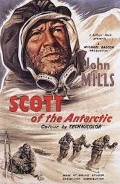
Directed by
Charles Frend
111 minutes
Rated PG
Reviewed by
Bernard Hemingway

Scott Of The Antarctic
Made in 1948 when Britain was struggling to recover from the devastation of WWII Scott of the Antarctic portrays Captain Robert Falcon Scott’s disastrous 1912 mission to the geographic South Pole as a story of courageous self-sacrifice on his part and that of his four companions, all of whom died on the homeward journey. Taken outside its context of what is known as the “Heroic Age” of polar exploration, it is hard however not to see the mission for what is was a jingoistically blinkered machismo, jaw-dropping endurance notwithstanding.
The first part of the film which tracks Scott’s efforts to raise funds for the expedition is dire, all terribly English “jolly good show” stuff familiar from innumerable war films of the period and featuring seemingly most of the Ealing Studio’s stock players of the time with John Mills in the title role. Written by Walter Meade, Ivor Montagu and Mary Hayley Bell (Mills’s wife) in a sub-Cowardian style and shot in saturated TechniColor by Jack Cardiff director Charles Frend adopts a martyological style that is simultaneously deceptive yet, given that you like this kind of thing (e.g.Powell and Pressburger's The Red Shoes, released the same year), perversely appealing.
The rest of the film which is shot in docudrama style is much more effective with the final third which covers the South Pole party’s deadly return slog having been beaten by Norwegian Roald Amundsen to the Pole achieving a real sense of pathos (there is much talk about the scientific value of the expedition but it is clear that getting to the Pole first was the aim of the exercise). Surprisingly, given itsconvincing realism, whilst there was some second unit location photography in Norway, the South Pole and the Swiss Alps, most of the film was shot in Ealing’s Pinewood studio.
Although the film is rather anodyne in its account of the arduous trek (the killing of the ponies for instance is all done off screen) and dramatically the film is superficial, for its time it was a substantial project and Vaughan Williams’ symphonic score gives it a suitably epic feel.
Want something different?





